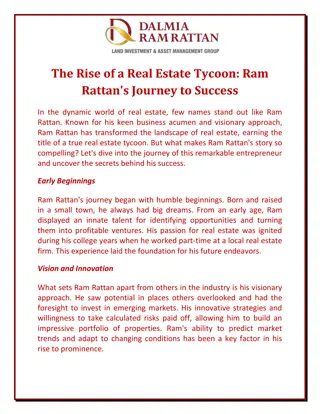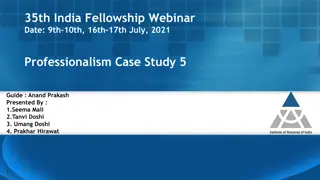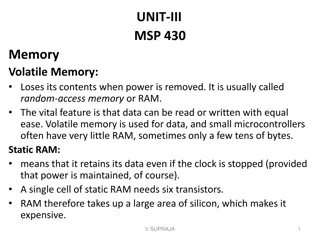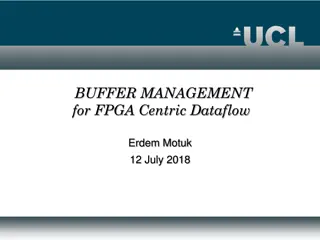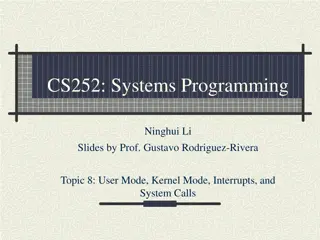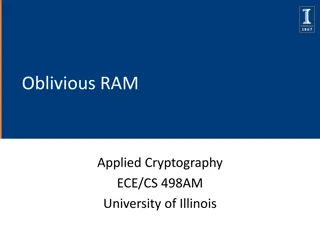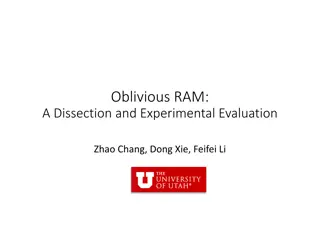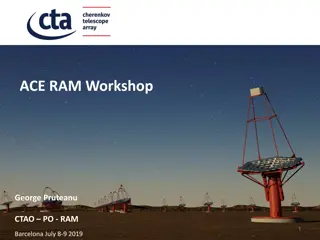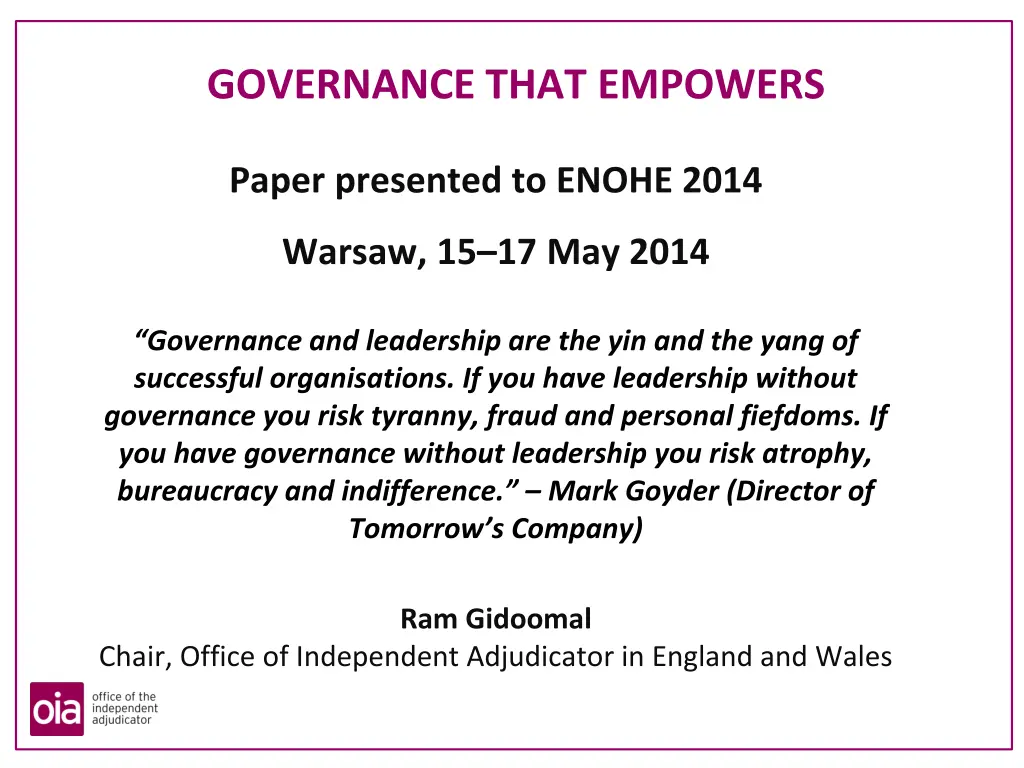
Empowering Governance: Leadership and Accountability in Organizations
Explore the interplay of governance and leadership within organizations and the importance of balancing both for success. Learn about the key principles of good governance, promoting transparency, accountability, and effectiveness. Discover how empowering governance focuses on organizational purpose, stakeholder engagement, and decision-making processes to create a robust and accountable framework.
Download Presentation

Please find below an Image/Link to download the presentation.
The content on the website is provided AS IS for your information and personal use only. It may not be sold, licensed, or shared on other websites without obtaining consent from the author. If you encounter any issues during the download, it is possible that the publisher has removed the file from their server.
You are allowed to download the files provided on this website for personal or commercial use, subject to the condition that they are used lawfully. All files are the property of their respective owners.
The content on the website is provided AS IS for your information and personal use only. It may not be sold, licensed, or shared on other websites without obtaining consent from the author.
E N D
Presentation Transcript
GOVERNANCE THAT EMPOWERS Paper presented to ENOHE 2014 Warsaw, 15 17 May 2014 Governance and leadership are the yin and the yang of successful organisations. If you have leadership without governance you risk tyranny, fraud and personal fiefdoms. If you have governance without leadership you risk atrophy, bureaucracy and indifference. Mark Goyder (Director of Tomorrow s Company) Ram Gidoomal Chair, Office of Independent Adjudicator in England and Wales
GOVERNANCE AND LIFE-EXPERIENCE History of an Outsider Non-Executive University Boards Refugee Business Background Court and Council of Imperial College, London Experience of Public Sector Governance St Georges, University of London Better Regulation Task Force Immigration and Nationality Complaints Audit Committee (Home Office) Middlesex University (visiting professor) History of an Outsider Epsom and St Helier NHS (hospital) Health Trust Non-Executive Chair of OIA since 2009. Equalities & Human Rights Commission Audit & Risk Committee 1
GENERIC PRINCIPLES OF GOVERNANCE Independence Openness and Transparency Accountability Integrity Clarity of Purpose Effectiveness Guide to principles of good governance, British and Irish Ombudsman Association, 2009 2
GOVERNANCE THAT EMPOWERS Governance that empowers: Focus on organisation s purpose and outcomes Performing effectively in clearly defined functions and roles Promoting and demonstrating values for the whole organisation Taking informed, transparent decisions and managing risk Developing the capacity of the governing body to be effective Engaging stakeholders and making accountability real The Independent Commission on Good Governance in Public Services, The Good Governance Standard for Public Services, 2004. 3
KEY FEATURES OF OIA GOVERNANCE Board has oversight of policy and business process but OIA Scheme is hybrid (public/private), overseeing Scheme created under national legislation, and operating under the 7 Principles of Public Life. (Selflessness, Integrity, Objectivity, Accountability, Openness, Honesty and Leadership) Has duty to uphold independence of complaints Scheme and of Independent Adjudicator whose operational decisions must not be interfered with Non-Executive Board has 9 Independent members including the Chair, and 6 members nominated by sector stakeholders. An additional independent student representative was appointed in 2011. Leaves Executive actions to Independent Adjudicator but requires him to be accountable for them. Quarterly Board Meetings and sub- committees of the Board dealing with finance, audit, remuneration policy and appointments. Board appoints Independent Adjudicator and Chief Executive and approves the Accounts. Monthly meetings between Chair and Independent Adjudicator 4
GOVERNANCE THAT EMPOWERS Ensuring and demonstrating the freedom of the Office- holder from interference in or undue influence over decision-making: Freedom from interference in decision-making on complaints Appropriate and proportionate structure and financial arrangements Appointment, re-appointment and remuneration of office-holder consistent with ensuring independence Governance arrangements which ensure and safeguard the independence of the office-holder and scheme Those involved in governance of scheme to conduct themselves at all times in scheme s best interests Source: BIOA, 2009. 5
KEY LESSONS LEARNED: THE IMPORTANCE OF INDEPENDENCE 1. Independence is a necessary not sufficient condition for effective governance. ii) Independence to Governance Actions which question Executives about what the organisation is doing and how it does it. 2. Independence without Clarity of Purpose, Transparency or Accountability does not guarantee effective governance. 5. Need for working philosophy of governance. Nose in, fingers out principle is essential for managing Risk and making the organisation Accountable. 3. Independence is not an absolute concept in governance. Judgements need to be made about when recent experience becomes a conflict of interest 6. Independent nature of Non-Executive allows the Elephant in the Room to be confronted. 4. There is: i) Independence from Governance 7. Need for role clarity between Non- Executives and Executives. Actions which protect Executives from undue interference 8. Need for Trust between Board and Executives, especially between the Chair and Chief Executive. 6
GOVERNANCE THAT EMPOWERS: A CASE STUDY WHEN UNIVERSITIES FAIL TO IMPLEMENT OR COMPLY WITH THE RECOMMENDATIONS OF THE OMBUDSMAN E.G. Westminster; Southampton
GOVERNANCE THAT EMPOWERS: A CASE STUDY OIA Scheme Rules compliance and non-compliance Rule 6.5 The parties shall comply promptly with any reasonable and lawful request for information the Reviewer may make relating to the Review. Rule 7.5 The OIA expects the HEI to comply with the Formal Decision and any Recommendation in full, and in a prompt manner. Rule 7.7 Any non-compliance by an HEI with a Recommendation will be reported to the Board and publicised in the Annual Report.
GOVERNANCE THAT EMPOWERS: A CASE STUDY 1. Southampton University At the 31st OIA Board Meeting on 10 December 2010, the Independent Adjudicator reported that Southampton University was non-compliant under Rule 7.5 in respect of 2 cases and that the University was also in breach of Rule 6.5 in a further case. After consideration of the evidence including university written submissions and in accordance with Scheme Rule 7.7, the OIA Board agreed unanimously that the non-compliance should be published in the 2010 Annual Report. The background to the non-compliance was a failure (in one case), despite repeated requests, to provide written confirmation of compliance with a Formal Decision issued in March 2010, and (in the second case) a continuing stated reluctance to comply with a Formal Decision four months after it had been issued. In the third case, the University delayed in responding to requests for evidence in a case over a period of ten months, notwithstanding repeated reminders. The Independent Adjudicator wrote to the Vice-Chancellor, whose subsequent intervention began a process of constructive engagement in which the University accepted the feedback on the individual cases, confirmed compliance in one case, complied with OIA Recommendations in the second case, and submitted evidence in the third case. The University reviewed its complaints handling processes in the light of the inadequacies exposed and placed its bilateral relationship with the OIA on a new, positive basis.
GOVERNANCE THAT EMPOWERS: A CASE STUDY 2. Westminster University At the 33rd (Special) OIA Board Meeting on 6 May 2011, the Independent Adjudicator reported that Westminster University was non-compliant under Rule 7.5 in respect of 2 cases. After consideration of the evidence, including university written submissions, and in accordance with Scheme Rule 7.7 the OIA Board agreed unanimously that the non-compliance should be published in the 2010 Annual Report. The background to the non-compliance included significant delay in implementing and demonstrating implementation of OIA Recommendations during 2010 and early 2011. In one case the University failed to provide evidence that it had satisfactorily reviewed the mitigating circumstances of a disabled student. In the other case, the University failed to provide evidence that it had properly conducted an independent review of a contested examination question and its marking scheme. There followed a constructive engagement between the OIA and the University including the involvement of the Vice-Chancellor. In this process, the University satisfied the Independent Adjudicator that it had complied with some of the outstanding Recommendations and provided a timetable for compliance with others. The University also agreed to take further steps to comply with two outstanding Recommendations specific to the individual students. As a result of this process, lines of communication between the OIA and the University have been significantly improved. The University is working with the OIA towards compliance with the Recommendations.




